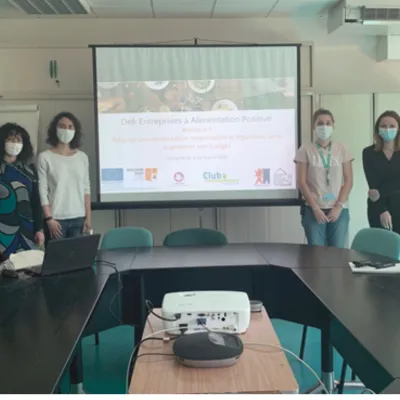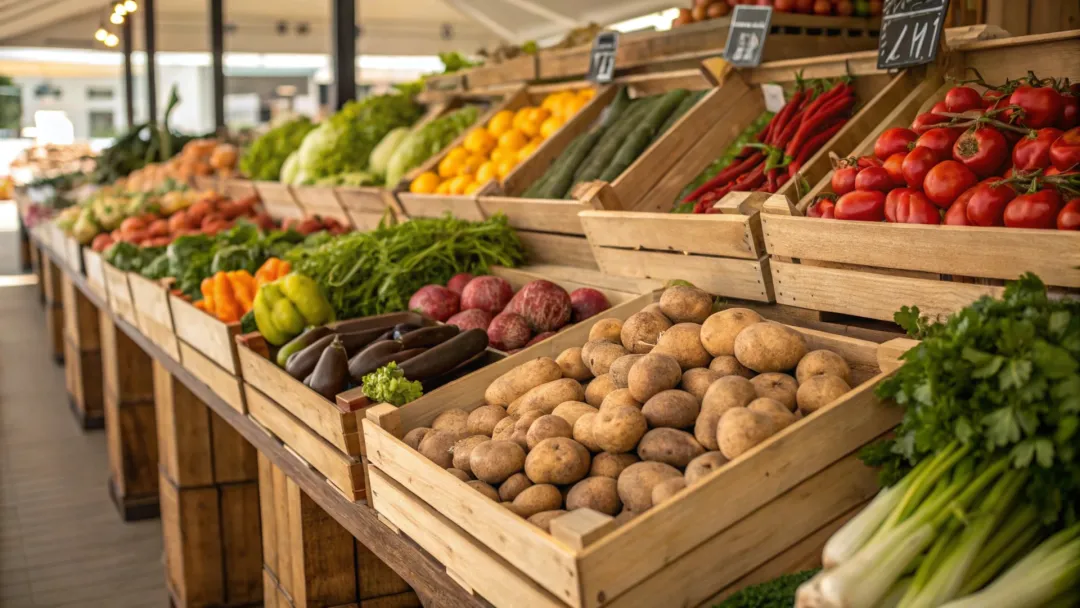General information
RDP Priority
- P1. Knowledge transfer and innovation
RDP Focus Area
- 1A: Innovation & cooperation
RDP Measure
- M16: Cooperation
Beneficiary type
- Public authority / body
Summary
In 2019, the municipality of Mouans-Sartoux, in partnership with the AgriBio06 association for organic agriculture and the Entrepreneurs Club of Grasse County, launched a project to promote the consumption of organic and local food in company canteens and restaurants. Working towards the goal of ensuring that 50% of food consumed onsite by employees and customers would be organic and locally produced, the project delivered a range of support actions across two work phases. Thanks to this remarkable initiative, around 15 local companies and several restaurants have now changed their procurement practices and are working with new, local providers. Additionally, their employees have learned about local, sustainable food products and producers.
Results
- The project contributed to developing links between local companies and caterers, service providers, producers, etc.
- The employee awareness-raising activities provided information about local food systems and cooking, which has already contributed to changes in food consumption and shopping behaviour.

Promoter
Municipality of Mouans-Sartoux; association AgriBio06; Entrepreneurs Club of the Grasse County
Funding
RDP support: 200 000(EUR)
EAFRD: 160 000 (EUR)
National/Regional: 40 000 (EUR)
Ressourcen
Context
Since 2010, the municipality of Mouans-Sartoux (South Region) has been supporting its 10 000 inhabitants to transition towards a more sustainable and local food system.
As a first step, in 2012, the municipality financed two projects, ‘URBACT Biocanteens’, to enable the provision of 100% organic and local food to school canteens and to reduce food waste by 80%. Furthermore, to embed and focus its food policy, Mouans-Sartoux created the Educational House for Sustainable Food (MEAD – Maison d’Éducation à l’Alimentation Durable) as a specific department of the city hall.
Later, in order to expand the scope of this work, the municipality launched a new project focusing on the food that is available in company canteens. Indeed, every day, more than 22 000 employees of the territory eat their lunch together at work. Local businesses therefore have an important role to play in supporting change in food consumption cultures.
Objectives
Overall, this project aimed to increase the consumption of local and organic food in companies; either in staff canteens, where employees are served meals, or in staff kitchens where employees can prepare their own food. Specific operational objectives included:
- raising awareness about sustainable food cultures among business leaders and their employees, and embedding new practices of sustainable food consumption.
- increasing the links between local, sustainable food providers and the businesses/employers that operate in the territory.
- supporting restaurants to transition to sustainable practices, with a shared target of at least 50% of organic, locally-produced food, and a reduction in meat consumption.
- launching a Food Truck service to deliver healthy, locally-produced food to business activity zones.
- developing AMAPs (associations supporting small-scale farming) in companies.
Activities
Divided into two phases - both funded by the EAFRD - the project was delivered in partnership with the AgriBio06 association for organic agriculture and the Entrepreneurs club of Grasse County (Club des Entrepreneurs de Grasse).
The first phase (2019-2022) aimed to work with the territory’s SMEs to boost the provision of local and organic food via employee canteens and kitchens. Activities included:
- creating a working group on ‘Sustainable Food in Companies’ together with 15 companies from the territory. Members gathered every six weeks to coordinate actions and discuss the progress of the project.
- launching a campaign of awareness-raising workshops and communications material for companies and employees, promoting sustainable food culture and cooking skills.
- creating specific procurement guidance for companies to help them integrate sustainability criteria into their contractual arrangements with food providers.
- delivering local and organic food produce to employees.
The second phase (2022-2024) focused on local restaurants, supporting them to source organic food from local providers. Activities included:
- providing financial support to four restaurants that volunteered to buy sustainable and local food products.
- raising awareness among restaurateurs about the impact of food product purchasing and consumption on carbon emissions.
- establishing a sustainable and local food working group to champion culture change at the territorial level.
- launching a Food Truck service to deliver healthy, locally-produced food to business activity zones.
- developing in-company associations that support employees in purchasing and consuming local food.
Main results
The project led to several results:
- cooking factsheets promoting the use and nutritional value of seasonal produce; workshops and conferences about sustainable food; in-company, collective vegetable gardens for employees.
- the first edition of the ‘Companies for sustainable food’ challenge was launched in April 2021, involving three local companies in a series of practical workshops (held during lunch breaks), a site visit to a local producer, and small challenges to help employees adopt consumption habits that are more respectful of the environment and their own health.
- a freely available procurement guide for companies to help them integrate sustainability criteria into their contractual arrangements with food providers.
- one good practices report, showcasing 11 examples from the project-participant companies and providers, promoting their work and sharing tips for replication/implementation.
- financial support was provided to four restaurants that volunteered to buy sustainable and local food products.
- the project’s Food Truck service delivers healthy, locally-produced food to business activity zones, and the AMAPs (in-company associations) continue to support employees in purchasing and consuming local food.
Key lessons
- A significant part of the project consisted of information and awareness-raising actions for companies and their employees, since only a few companies provided sustainable food to their staff. There was a need to clearly illustrate the benefits of local food consumption, both in financial terms and in terms of well-being and public health. The creation of vegetable gardens and staff kitchens was a great way to support the collective uptake of new consumption habits.
- Companies need to be supported in this culture change process! Two people (one from the Entrepreneur’s Club and one from the Mouans-Sartoux municipality) worked part-time to deliver the project activities and provide support to participating businesses, helping them to build relationships with local food suppliers and implement the project’s recommendations.
When we talk about local and sustainable food, there is a public health issue, an economic issue and an issue of transformation of practices. The project has shown that eating well can be a pleasure, the source of new forms of conviviality and a benefit, both for employees and companies.
Gilles Perole & Léa Sturton

